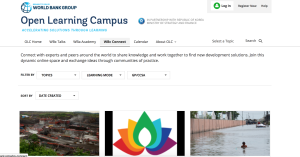
Reposting here from Panoply Digital.
Revisiting the world of education ahead of some workshops we are doing in Nigeria and Cambodia where we discuss using open learning as a professional development strategy, (along with some modules on secure communication, online research, and developing an online presence), I wanted to highlight an organization that has done some good work in this area. The World Bank recently launched the Open Learning Campus, a clearinghouse of sorts for all their open learning materials, courses, and talks. While many organizations are doing this type of thing, a welcome trend, I particularly find the World Bank’s approach to be clever in that they are grounding the structure itself on theory. While some implicitly do the same (and many not at all), it is refreshing to see here.
The theory itself is Community of Practice theory (Lave & Wenger, 1991) which basically states that much of how we learn is based on our relative position in or near a community of individuals dedicated to a particular task. Amateur photographers, development workers, teachers, doctors, community members all, all have specific practices they perform with specific materials and their identity evolves as a result. The Open Learning Campus itself has a clear level-headed focus on practitioners, those working in the fields that the World Bank serves: development finance, public private partnerships, gender, energy, and more. So the match between theory and structure is sound here.
The structure is broken down into
- WBx Talks: Self-paced, a la carte selection of talks modeled (I am assuming) a bit on TED talks. Targeting amateur enthusiasts to practitioners
- WBa Academy: These are the actual courses, self-paced for the most part, including their MOOCs. Higher levels of engagement and ideally moving from amateur to practitioner.
- WBc Connect: these are where the theory comes in for the most part. Communities of practice for practitioners to share lessons learned, best practices, etc. A social network of sorts for professionals.
So these three sections work ideally in conjunction providing greater levels of engagement as needed, orbits of activity with the community of practice at the center. Some of the communities of practice themselves are directly geared towards the work that we do here at Panoply Digital as well, like:
- Gender and Energy: The online space for gender and energy aims to bring together practitioners from around the world to share experiences, emerging tools, available resources, and knowledge on Gender Equality and Energy through an interactive platform.
- Sexual Orientation and Gender Identity (SOGI) and Development: This Community of Practice, on the topic of Sexual Minorities and Development, is the platform for World Bank staff and international development practitioners everywhere to share information, understand policy alternatives, and identify potential solutions, for sexual minority-inclusive development interventions.
- Knowledge Hubs CoP: Since March 2013, this Community of Practice (CoP) has allowed development practitioners and sector experts in thematic institutions to share experiences and lessons so that they can improve the efficiency and impact of their services.
I will keep scouting for more open learning platforms that specifically serve the development communities, but if any are thinking of kicking one off, I would think this would be a good model to start with. It structures activity around community and identity, which is exactly what a lot of ICT4D is or should be attempting to do. We need to be more concerned with maintaining and augmenting communities that already exist, rather than assault them with the empty marketing rhetoric of distuption. Fix supply chains, fix governance, encourage participation, but maintain the core communities on which societies revolve.

Open Learning Campus: Theory + Pragmatism https://t.co/4nnJwTdlDN by @mseangallagher #elearning #open https://t.co/rss5NX7OhI
Top story: Open Learning Campus: Theory + Pragmatism | Michael Sean Gallagher https://t.co/n6onO3AH3c, see more https://t.co/Y9FvVdbm2e